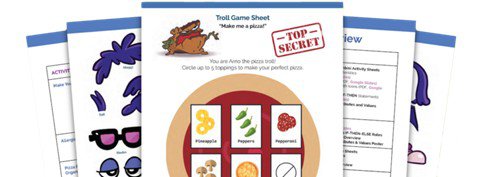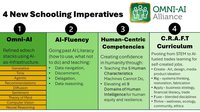Following research done on data literacy and inspired by development of a children’s visual exploratory data tool in the 1990’s, Broderbund and TERC created an educational logical thinking skills game featuring the Zoombinis, little blue creatures each with distinct personalities and appearances, escaping imprisonment by the evil Bloats and making their way to the safety of Zoombiniville.
Introduced in 1996 “Logical Journey of the Zoombinis” became a hit in the popular edutainment category, selling half a million copies, spawning two sequels, and appealing both to parents and teachers looking for a truly engaging, fun to play game that was also educational. Fans who grew up on Zoombinis, some inspired by the game to go into computer science and similar fields and others nostalgically looking for the same experience for their children, as well as teachers who kept 10 year old computers running in their classrooms just to play Zoombinis, regularly appealed to TERC to bring back the game for modern platforms.
Zoombinis maps very well to the learning of what are now called “computational thinking skills,” and with partners FableVision Studios and Learning Games Network, TERC relaunched Zoombinis in 2015 for tablets and desktop computers, and is now bringing Zoombinis to the classroom with FableVision Games, backed by research on the effectiveness of Zoombinis in educational settings.
Formats/platforms used:
IOS/Android/Kindle App as well as Steam on Mac/Windows.
What is your primary website’s URL?
https://www.terc.edu/zoombinis/
Problem solved:
Zoombinis, with its twelve math-based logic puzzles and four levels of difficulty, helps reinforce key computational thinking skills. It encourages problem decomposition by breaking complex problems into simpler, more manageable parts. Players develop automation by predicting and planning ordered steps for efficient solutions. The game strengthens understanding of algorithms and procedures by requiring players to identify and apply structured sets of instructions to solve puzzles. Data representation plays a crucial role as players interpret multiple forms of information to organize and solve challenges. Additionally, Zoombinis promotes abstraction and formulation, helping learners recognize general algorithms or procedures that apply across different problem types. Finally, generalization is reinforced as players apply common problem-solving strategies to a range of challenges, building a strong foundation for computational thinking.
Grade/age range:
For kids and adults of all ages.
Zoombinis Clubs builds on the game's decades-long popularity to create engaging experiences for students in grades 3-7

Does Zoombinis address core/supplemental/special needs/extracurricular/professional development?
Research on Zoombinis in the classroom highlights its benefits for digital learning, including:
● Improved computational thinking skills like problem decomposition, pattern recognition, and algorithm design.
● Strong performance among neurodiverse learners, including those with ADD, autism, and dyslexia.
● Support for Executive Function strategies, such as breaking down complex problems and recognizing key patterns.
Standards:
Zoombinis supports standards-aligned computational thinking practices, as defined by the Computer Science Teachers Association, including problem decomposition, pattern recognition, abstraction, and algorithm design. Educators using the K-12 or Clubs version gain access to professional development and classroom materials designed to integrate these concepts seamlessly into learning environments.

Lesson time needed:
Teachers in our study used Zoombinis for 5–15 hours, with some creating their own materials. For those following the core five activities, approximately 10 hours is a reasonable classroom estimate.
Pricing models:
Zoombinis offers flexible options for both individual and educational use:
- Individual App – Available on iOS and Google Play for $3.99.
- School Version – A web-based edition with a teacher dashboard and professional development starts at $5/seat, with bulk discounts. Schools registered with Apple can contact zoombinis@terc.edu for iOS app discounts.
- Zoombinis Clubs – Designed for after-school programs, libraries, and home use, this annual $250 subscription includes a facilitation guide, how-to-play videos, and printable materials. For more info, contact zclub@fablevisionlearning.com.

Characteristics:
Zoombinis emerged from TERC’s research on how children engage with data and visual representations. By experimenting with accessible and engaging visual approaches, the team developed a game that is truly learner-centered—focused on discovering the “game in math” rather than forcing math into a game. The result? A seamless integration of key computational thinking skills—problem decomposition, pattern recognition, abstraction, and algorithm design—aligned with today’s growing emphasis on STEM education.

What users are saying:
“And one of our students, JB I’ll call him, refuses to write in math class. He doesn’t have this skill and is really reluctant. However, in Zoombinis he became our class leader. He could describe and solve, and communicate.”
- Elementary School Educator











